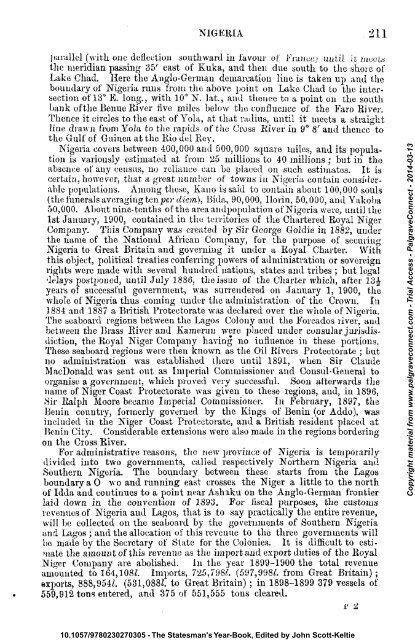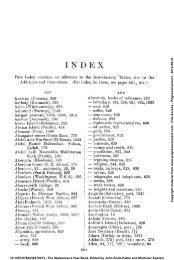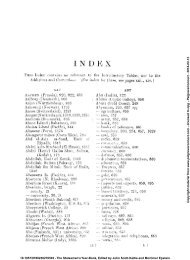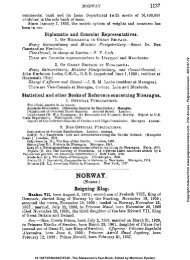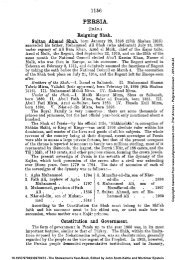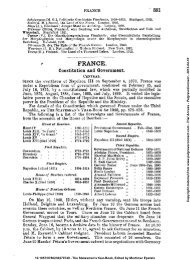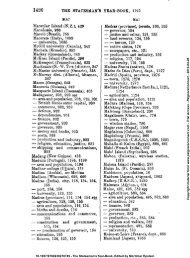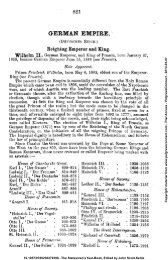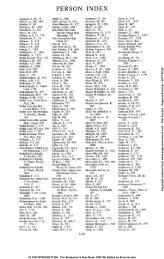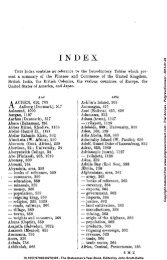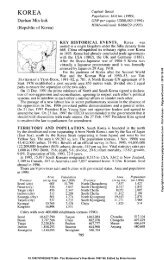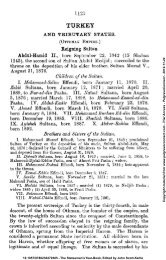uganda protectorate - Palgrave Connect
uganda protectorate - Palgrave Connect
uganda protectorate - Palgrave Connect
You also want an ePaper? Increase the reach of your titles
YUMPU automatically turns print PDFs into web optimized ePapers that Google loves.
10.1057/9780230270305 - The Statesman's Year-Book, Edited by John Scott-Keltie<br />
NIGERIA 211<br />
parallel (with one deflection southward in favour of France; until it meets<br />
the meridian passing 35' east of Kuka, and then due south to the shore of<br />
Lake Chad. Here the Anglo-German demarcation line is taken up and the<br />
boundary of Nigeria runs from the above point on Lake Chad to the intersection<br />
of 13° E. long., with 10° N. lat., and thence to a point on the south<br />
bank ofthe Benue River five miles below the confluence of the Faro River.<br />
Thence it circles to the east of Yola, at that radius, until it meets a straight<br />
line drawn from Yola to the rapids of the Cross Kiver in 9° 8' and thence to<br />
the Gulf of Guinea at the Rio del Rey.<br />
Nigeria covers between 400,000 and 500,000 square miles, and its population<br />
is variously estimated at from 25 millions to 40 millions ; but in the<br />
absence of any census, no reliance can bo placed on such estimates. It is<br />
certain, however, that a great number of towns iu Nigeria contain considerable<br />
populations. Among these, Kano is said to contain about 100,000 souls<br />
(thefunerals averaging tender diem), Bida, 90,000, Ilorin, 50,000, and Yakoba<br />
50,000. About nine-tenths ofthe area andpopulation of Nigeria were, until the<br />
1st January, 1900, contained in the territories of the Chartered Royal Niger<br />
Company. This Company was created by Sir George Goldie in 1882, under<br />
the name of the National African Company, for the purpose of securing<br />
Nigeria to Great Britain and governing it under a Royal Charter. With<br />
this object, political treaties conferring powers of administration or sovereign<br />
rights were made with several hundred nations, states and tribes ; but legal<br />
delays postponed, until July 1886, the issue of the Charter which, after 13J<br />
years of successful government, was surrendered on January 1, 1900, the<br />
whole of Nigeria thus coming under the administration of the Crown. In<br />
1884 and 1887 a British Protectorate was declared over the whole of Nigeria.<br />
The seaboard regions between the Lagos Colony and the Forcados river, and<br />
between the Brass River and Kameruu were placed under consular jurisdisdictiou,<br />
the Royal Niger Company having no influence in these portions.<br />
These seaboard regions were then known as the Oil Rivers Protectorate ; but<br />
no administration was established there until 1891, when Sir Claude<br />
MacDonald was sent out as Imperial Commissioner and Consul-General to<br />
organise a government, which proved very successful. Soon afterwards the<br />
name of Niger Coast Protectorate was given to these regions, and, in 1896,<br />
Sir Ralph Moore became Imperial Commissioner. In February, 1897, the<br />
Benin country, formerly governed by the Kings of Benin (or Addo), was<br />
included in the Niger Coast Protectorate, and a British resident placed at<br />
Benin City. Considerable extensions were also made in the regions bordering<br />
on the Cross River.<br />
For administrative reasons, the new province of Nigeria is temporarily<br />
divided into two governments, called respectively Northern Nigeria and<br />
Southern Nigeria. The boundary between these starts from the Lagos<br />
boundary a O wo and running east crosses the Niger a little to the north<br />
of Idda and continues to a point near Ashiku on the Anglo-German frontier<br />
laid down in the convention of 1893. For fiscal purposes, the customs<br />
revenues of Nigeria and Lagos, that is to say practically the entire revenue,<br />
will bo collected on the seaboard by the governments of Southern Nigeria<br />
and Lagos ; and the allocation of this revenue to the three governments will<br />
bo made by the Secretary of State for the Colonies. It is difficult to estimate<br />
the amount of this revenue as the import and export duties of the Royal<br />
Niger Company are abolished. In the year 1899-1900 the total revenue<br />
amounted to 164,1082. Imports, 725,7982. (597,9982. from Great Britain) ;<br />
exports, 888,9542. (531,0882. to Great Britain) ; in 1898-1899 379 vessels of<br />
559,912 tons entered, and 375 of 551,555 tons cleared.<br />
i' 2<br />
Copyright material from www.palgraveconnect.com - Trial Access - <strong>Palgrave</strong><strong>Connect</strong> - 2014-03-13


